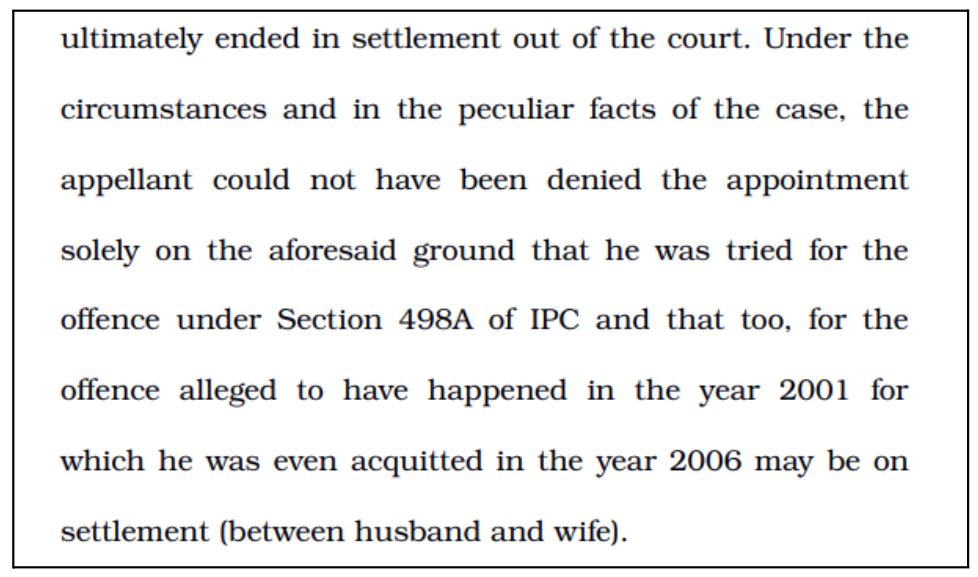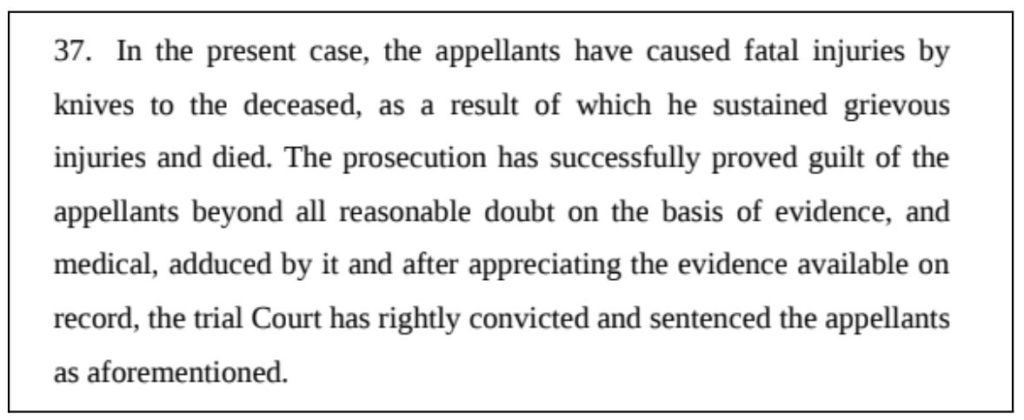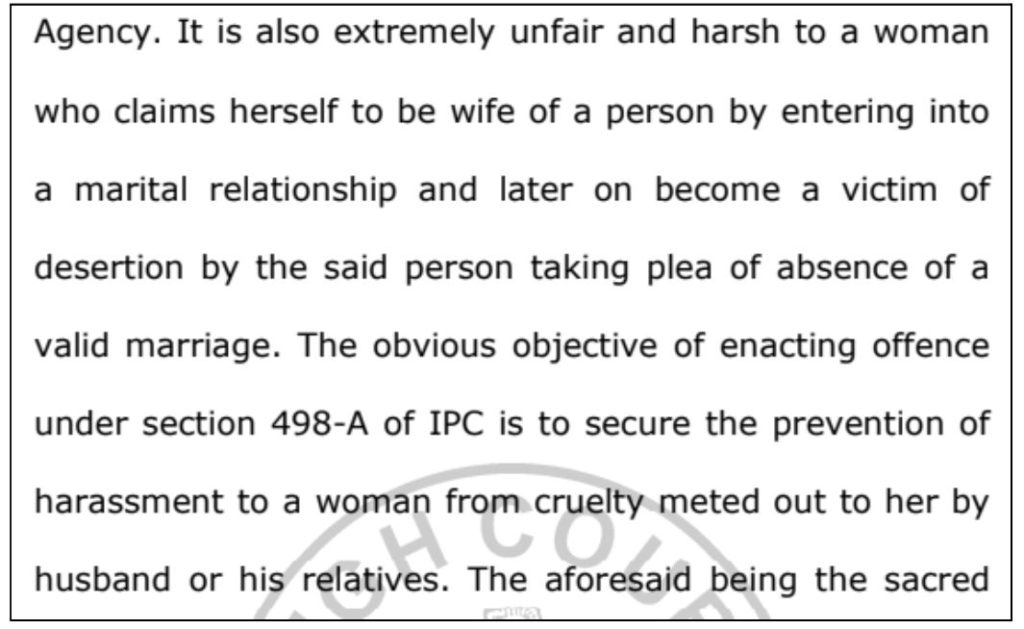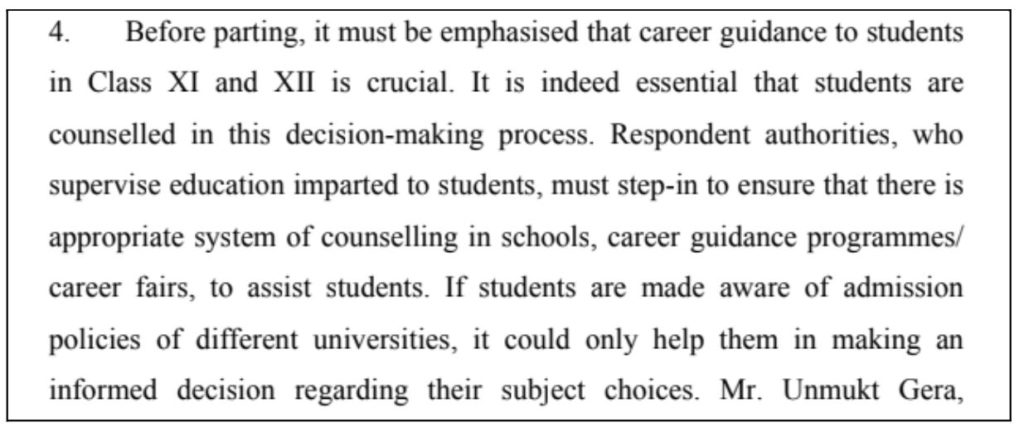In this week’s review of Court Judgments, we look at Supreme Court’s ruling that appointment of candidate cannot be declined just because they were tried for offence under Section 498A, Allahabad HC’s decision that Life imprisonment is the minimum sentence for a person convicted of murder, Odisha HC’s ruling that case booked under Section 498A cannot be quashed because the Family Court found ‘Marriage Invalid’.
SC: Appointment of candidate cannot be declined just because they were tried for offence under Section 498A
The appellant in Pramod Singh Kirar vs. State of Madhya Pradesh had applied for the post of Police Constable in 2013. He was found to be meritorious and eligible to be appointed for the post. In the verification form, he had mentioned that he was he was tried for the offence under Section 498A of IPC earlier. In 2006, he was acquitted for the offence by the Trial Court. Despite his voluntary disclosure during application, his candidature was rejected in 2014 on grounds that he was involved in a criminal case. The Madhya Pradesh High Court (Division Bench) upheld the rejection observing that if the candidate is found to be involved in a criminal case, the employee can consider the antecedents of the candidate and is not compelled to appoint the candidate.
The Supreme Court Bench of Justices MR Shah and CT Ravikumar while hearing the appeal observed that the offence for which the appellant was tried and acquitted was a matrimonial dispute which was settled out of the court. The Bench held that the appellant’s trial for offence under Section 498A of IPC for the offence alleged to have happened in the year 2001 which resulted in acquittal in 2006 was no ground for denying his appointment.
The apex court also noted that there was no suppression of material fact in the case. Quashing the High Court’s decision and allowing the appeal, the Supreme Court directed the state to appoint the appellant as Police Constable within four weeks.

Allahabad HC: Life imprisonment is the minimum sentence for a person convicted of murder
In Vakeel Quraishi and 2 Others vs. the State of Uttar Pradesh, the accused Vakeel Quraishi, Uvaish, and Aarfeen had been found guilty by the trial court of murdering the Mukim by stabbing him with knife for not inviting them to his brother’s marriage. They also had previous enmity too with him. They had also threatened to kill the brother and another person who came to the spot to save the deceased. The three accused were convicted and sentenced to undergo life imprisonment by the Trial Court.
The accused appealed to the Allahabad High Court which scrutinized the testimonies of the eyewitnesses again. The High Court was satisfied with the evidence and stated that the evidence cannot be disbelieved merely on the ground that the witnesses are related to each other or to the deceased. Referring to previous judgements, it added that in case the evidence has a ring of truth to it, is cogent, credible, and trustworthy, it can, and certainly should be relied upon. Further, it noted that minor discrepancies are bound to occur and are not enough to discredit the otherwise trustworthy witnesses since witnesses are not expected to recreate the scene.
According to the High Court, the Trial Court was right in holding the appellants guilty of committing the alleged offence as all the evidence also supported it. Upholding the Trial Court’s decision, the High Court also added that once an accused is held guilty for murder (Section 302 IPC), the minimum punishment imposable is life imprisonment and any punishment/sentence less than that is contrary to Section 302 of IPC.

Odisha HC: Case booked under Section 498A cannot be quashed because the Family Court found ‘Marriage Invalid’
In Jaga Sarabu vs. State of Orissa and another, an FIR was registered against the accused-petitioner for commission of offences punishable under sections 498A, 323, 506, 34 IPC read with Section 4 of Dowry Prevention Act (cruelty to wife for dowry). A charge-sheet was also filed against him. The Magistrate Court upon scrutiny of the materials and documents produced by the investigating officer and finding prima facie case, took cognizance and issued process. Challenging the Magistrate’s order, the petitioner approached the Odisha High Court.
According to the petitioner’s contentions, the Family Court had established that the woman was not the legally married wife of the petitioner. Marriage being invalid, it was contended that criminal proceeding for offence under Section 498A of IPC could not be maintained. Meanwhile, the respondent’s argument was that the petitioner being the husband of the woman cannot take the plea that the marriage was invalid. Further, husband contracting second marriage during the subsistence of earlier marriage can be charged for offence under section 498A of IPC and merely because a judgment is rendered by the Family Court in proceeding under section 125 of CrPC, the Court by itself cannot declare the woman as ‘concubine’ of the petitioner.
Hearing both sides, the Odisha High Court observed that the Family Court could not have given a finding on the validity of marriage while deciding an application for maintenance under Section 125 CrPC since a civil proceeding is needed after the assessment of evidence and pleadings on record. The Court added that the plea of ‘no marriage’ was advanced by the petitioner in the course of hearing of the application before the High Court under Section 482, CrPC. and the case was under the jurisdiction of Civil Court.

The Court concluded that there were prima facie materials for proceeding against the petitioner for offences alleged against him after considering the allegations mentioned in the FIR and statement of witnesses and other documents which were collated during the investigation. It upheld the Magistrate Court’s decision.
Delhi HC: Career guidance to students in Class XI and XII is crucial and they should be counselled in this decision-making process.
In Shishram as Guardian of Mr. Kawal vs. Bal Bhavan International School & Others, the petitioner’s son had failed to secure admission in colleges affiliated with Delhi University (DU) in 2020. According to him, the lack of career guidance at school was the reason. His son had opted for Mass Media Studies and Physical Education in Class XI and XII. He was not aware and cautioned that these subjects were not considered “Main” subjects by DU and are treated as “Elective” attracting penalty of 2.5% deduction of marks from aggregate marks for the purpose of selection in colleges of DU. In his petition, he prayed for intervention of statutory authorities like Central Board of Secondary Education (CBSE) and Delhi government to ensure proper dispensation of information and guidance to students at the time of subject selection in Class XI and XII. He also wanted action against the school and compensation for the alleged prejudice caused to the students.
Rejecting the petitioner’s plea for cancelling the accreditation of the school and to compensate the students, the Delhi High Court stated that ‘improper career counselling to some students cannot be a ground for de-affiliation/ de-accreditation, in absence of any statutory provision that provides for such a penalty’. It observed that there was no reason for the Court to hold that the school should have disapproved or opposed the option because of its likely impact in admission prospects to DU. The decision was purely voluntary with parents’ involvement and not forced upon the student by the school.
However, while dismissing the petition, the Court directed the Government of Delhi to inform schools to impart career guidance to students for informed decision making.



